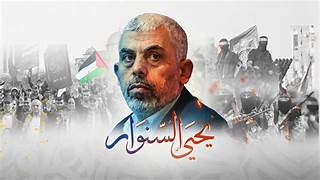Blood for Negotiations
Tariq Al-Homayed/Asharq Al-Awsat newspaper/September 01/2024
الدم مقابل المفاوضات
طارق الحميد/الشرق الأوسط/01 أيلول/2024
كان المبدأ في منطقتنا، وعلى خلفية الصراع العربي والفلسطيني – الإسرائيلي، هو مبدأ الأرض مقابل السلام، وذلك كتفسير قانوني لقرار مجلس الأمن رقم 242، الذي اعتُبر أساساً لصنع السلام. لكننا اليوم أمام مبدأ آخر وهو «الدم مقابل المفاوضات»، وليس حتى السلام، وأبرز مثال على ذلك إعلان المرشد الإيراني علي خامنئي إمكانية تجديد المفاوضات مع واشنطن حول البرنامج النووي.
وقال خامنئي لحكومة بلاده الجديدة إنه «لا ضرر» بالتعامل مع «عدوها»، مضيفاً أن «هذا لا يعني أننا لا نستطيع التفاعل مع نفس العدو في مواقف معينة»، لكن «لا ضرر بذلك، ولكن لا تضع آمالك فيها». حسناً، هل من ضير بأن تكون هناك مفاوضات إيرانية أميركية على خلفية الاتفاق النووي؟ الأكيد لا. ولا أحد يطمح لرؤية حرب مدمرة بالمنطقة، لكنّ هناك خللاً حقيقياً، وملاحظة جادة لا يمكن تجاهلها. وهي توقيت المفاوضات! يبارك المرشد الإيراني هذه المفاوضات الآن رغم أن الحرب على غزة تدخل شهرها الحادي عشر، وبكلفة أربعين ألف قتيل، ودمار شامل في غزة من قِبل الآلة العسكرية الإسرائيلية، ودون إظهار أي مرونة من قِبل نتنياهو. ويبارك المرشد المفاوضات مع احتمالية توسع الجبهة الإسرائيلية اللبنانية، مع «حزب الله». وبعد اغتيال إسماعيل هنية في طهران. ومع التوغل الإسرائيلي بالضفة الغربية، وطهران دائماً ما تتهم واشنطن بدعم إسرائيل ومشاركتها ما يحدث بالمنطقة. ويبارك المرشد المفاوضات الآن وبلاده، وميليشياتها، كانت ترى أن السابع من أكتوبر (تشرين الأول) هو لوقف المفاوضات السعودية الأميركية التي كان من صميمها الحفاظ على القضية، والشروع بمشروع الدولة الفلسطينية.
وقال المرشد الإيراني، العام الماضي، إن «طوفان الأقصى» جاءت باللحظة المناسبة، وإن «مَن قام بها أفشل المخطط الكبير للشرق الأوسط الجديد»، مضيفاً أن «طوفان الأقصى» كانت بالضبط ما تحتاج إليه المنطقة، بحسب وكالة «تسنيم» الإيرانية. والأمر الآخر، سياسياً، يبارك المرشد المفاوضات الآن والإدارة الأميركية بمرحلة «البطة العرجاء» مما يعني أن طهران تريد «إضاعة الوقت» لتجنب أي حرب، والسعي للسلامة، وحتى موعد الانتخابات الأميركية مثلها مثل نتنياهو الذي يسعى لذلك من أجل تنفيذ مخططاته. كل هذا يؤكد أن السابع من أكتوبر كان مغامرة عبثية لم تؤتِ أُكلها بالنسبة لإيران، التي عادت الآن للعب ورقة المفاوضات النووية على أمل تأمين مقعد تفاوض لها حول غزة، ومحاولة حماية «حزب الله» من حرب مدمرة. ويحدث ذلك وسط صمت مَن أسميهم «مجاهدي الكيبورد»، وصمت كل مَن خون التفاوض مع واشنطن من أجل السلام. ويحدث ذلك والخرائط تتغير فعلياً بغزة، وكتبت محذراً في 11 أكتوبر 2023 «الحذر من تغيير الخرائط»، ونالنا من التخوين ما نالنا، وها هو واقع الآن. وعليه، السؤال الآن لكل المنظرين، ومنذ السابع من أكتوبر، هل مقبول تدمير غزة بسبب هذه المصالح؟ هل مقبول تدمير أربع دول عربية لتحقيق أهداف إيرانية؟ وهل مقبول هذا التدمير الممنهج للإنسان العربي بشعارات بالية؟
وسؤال الأسئلة هو: متى تتعلم منطقتنا، والأثمان التي دُفعت حقيقية ومؤلمة؟
Blood for Negotiations
Tariq Al-Homayed/Asharq Al-Awsat newspaper/September 01/2024
The guiding principle in our region, historically shaped by the Arab-Palestinian-Israeli conflict, was once “land for peace.” This concept served as the legal interpretation of UN Security Council Resolution 242, which was seen as a foundation for peace.
Today, however, we face a new reality: “blood for negotiations”- not even for peace. A striking example of this is Iranian Supreme Leader Ali Khamenei’s recent announcement that negotiations with Washington over the nuclear program could resume.
Khamenei told his new government that there is “no harm” in engaging with their “enemy,” adding: “This doesn’t mean we cannot interact with the same enemy in certain situations,” but cautioned them not to “pin their hopes” on it.
So, is there anything inherently wrong with Iranian-American negotiations over the nuclear deal? Clearly not. No one desires a devastating war in the region. However, a critical issue that cannot be overlooked is the timing of these negotiations.
Khamenei is endorsing these talks while the war on Gaza enters its 11th month, at the cost of 40,000 deaths and widespread destruction, with no sign of flexibility from Netanyahu.
He blesses these negotiations even as the possibility of an expanded Israeli-Lebanese conflict involving Hezbollah looms. This comes in the wake of Ismail Haniyeh’s assassination in Tehran, alongside Israeli incursions into the West Bank, while Tehran repeatedly accuses Washington of backing Israel and participating in regional conflicts.
Khamenei’s blessing comes at a time when Iran and its militias saw October 7 as a pivotal moment to halt Saudi-American negotiations, which were primarily aimed at preserving the Palestinian cause and initiating the establishment of a Palestinian state.
Last year, Khamenei stated that the Al-Aqsa Flood came at a critical juncture, claiming that those behind it “thwarted the grand plan for the new Middle East.” He added that the operation was precisely what the region needed, according to Iran’s Tasnim news agency.
Politically speaking, Khamenei’s support for negotiations is also notable because the US administration is in a “lame-duck” phase. This suggests that Tehran is seeking to “buy time” to avoid war, aiming to hold out until the US elections – much like Netanyahu, who is also seeking time to execute his plans.
All of this highlights the fact that the October 7 attack was a reckless gamble that did not yield results for Iran. Now, Iran has returned to the negotiating table over its nuclear program, hoping to secure a position in discussions about Gaza and to shield Hezbollah from a potentially catastrophic war.
This is happening amid the silence of those I call “keyboard warriors,” as well as those who once condemned peace negotiations with Washington as treasonous. Meanwhile, the geopolitical landscape in Gaza is shifting, something I warned about on October 11, 2023, when I said, “beware of changing borders.” I was accused of treason then, but today it is becoming reality.
Thus, the question for all the theorists, since October 7, is this: Is it acceptable to allow Gaza’s destruction for the sake of these interests? Is it acceptable for four Arab countries to be devastated in pursuit of Iranian goals? And is this systematic destruction of the Arab people, under outdated slogans, justifiable?
The ultimate question remains: When will our region learn, as the costs paid have been all too real and painful?




















